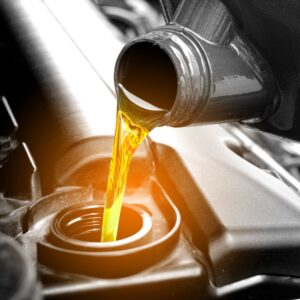Hyundai is known for manufacturing reliable vehicles, but that doesn’t mean their models are perfect. Some have been widely reported to develop engine problems over time or due to various conditions.
Reports show that problems with the Hyundai’s engine are not uncommon. The issues vary from model to model, and some problems are common across multiple Hyundai vehicles. For example, the Hyundai Tucson and the Hyundai Palisade (among other models) are known to have stalling engines.

The most common problems with Hyundai engines include sludge and carbon buildup, engine knocking and stalling, oil leaks, poor fuel economy, and reduced engine performance.
Carbon Deposits and Oil Sludge Buildup
Carbon buildup in Hyundai vehicles is a widely reported issue. It takes a long time for these deposits to form, yet they’re difficult to prevent because they naturally form when you use your vehicle.
The deposits come from incomplete fuel combustions. They can cause many problems, ranging from engine damage to reduced performance.
Similarly, oil sludge builds up in vehicles when the engine oil isn’t changed frequently enough, the oil filter is contaminated, or the engine oil used is low quality.
Sludge is formed when the engine oil is oxidized, becoming darker, thicker, and dirtier. This makes it more difficult for the moving parts of the engine to move without grinding against one another.
Regular maintenance goes a long way in preventing carbon and oil sludge buildup. It’s strongly recommended that you bring your Hyundai to an auto shop at least once a year to have a mechanic service it. This includes changing the engine oil and removing any carbon deposits that have formed.
Engine Knocking and Stalling
If your engine knocks, you might also encounter engine stalling. These two issues are among the most common Hyundai Tucson engine problems, but they can also occur in other Hyundai vehicles.
There are many potential causes for engine knocking and stalling, like worn timing belts, bad fuel systems, and problems with the transmission. Internal engine failure typically causes the engine to size up. This means Hyundai has had to replace a lot of engines over the years.
To fix these engine issues, you’ll need to determine what’s causing them. For example, if the timing belt is inoperative, it’s a good idea to replace it as soon as possible. If the culprit can be traced to the fuel system, examine it and make sure you’re using fuel that’s appropriate for your vehicle.
Oil Leaks
Oil leaks are among the most common Hyundai Palisade engine problems, though some owners of other models also report them. This problem is commonly caused by leaking oil filters, bad gaskets, and worn seals — though worn seals are inevitable and can become a problem in most vehicles, Hyundai or not.
Oil leaks are particularly damaging because engine oil is responsible for lubricating moving components in the engine. If these components aren’t sufficiently lubricated, they’ll grind against one another and get worn down or damaged.
When it comes to oil leaks, it’s important to pinpoint the cause before changing the oil. Inspect the seals, gaskets, and oil filters and replace anything that needs to be replaced. Keep an eye out for rust and corrosion in the affected areas.
Poor Fuel Economy
Reduced fuel efficiency is another common complaint by many Hyundai owners. This problem typically occurs when some parts malfunction or become inoperative. These components include fuel injectors, air filters, oxygen sensors, and fuel filters.
Unfortunately, the sheer number of components that can drastically increase fuel consumption makes addressing the issue difficult. It’s recommended to bring your vehicle to a mechanic for a proper diagnosis.
It’s also a good idea to change your driving habits. Reduce any unnecessary weight in your Hyundai’s storage spaces and ensure your tires are properly inflated. Consider changing the engine oil as well.
Reduced Performance
Many Hyundai owners have complained about sudden drops in their engine performance. Reports range from the vehicle becoming slow to accelerate to the engine shutting down.
There are many potential causes for reduced engine performance. This includes, but isn’t limited to, problems with the air filter, mass airflow sensor, fuel filter, catalytic converter, or oxygen sensor. Another possible cause is the presence of metal shavings and other debris in the engine oil, which can damage internal components, like the engine bearings.
If you notice your Hyundai’s engine performance is faltering, it’s best to bring your vehicle to a mechanic for an accurate diagnosis.
Get High-Quality Hyundai Parts and Accessories Today
If your engine is acting up, fixing it should be your number one priority. This is because ignoring the issue can only make things worse. Take carbon deposits as an example. If left unchecked, they can disrupt airflow in the engine and cause overheating, which can in turn lead to some costly engine damage. Unless you want to deal with a bigger repair bill, you should address the issue head-on and replace any faulty engine parts. Thankfully, getting replacement parts for your Hyundai has never been easier with CarParts.com.
CarParts.com offers a wide selection of high-quality engine components, such as fuel filters, oxygen sensors, and catalytic converters. For easier browsing, we recommend using our built-in vehicle selector. Simply input your Hyundai’s specific year and model, and you’ll see all the parts compatible with your ride. If you aren’t sure which product is right for your Hyundai, don’t hesitate to reach out to our customer service staff, who are available 24/7.
Don’t wait until your Hyundai engine completely fails before replacing any faulty parts. Check out our catalog of high-quality Hyundai parts and accessories at CarParts.com and order one today!
Any information provided on this Website is for informational purposes only and is not intended to replace consultation with a professional mechanic. The accuracy and timeliness of the information may change from the time of publication.




















